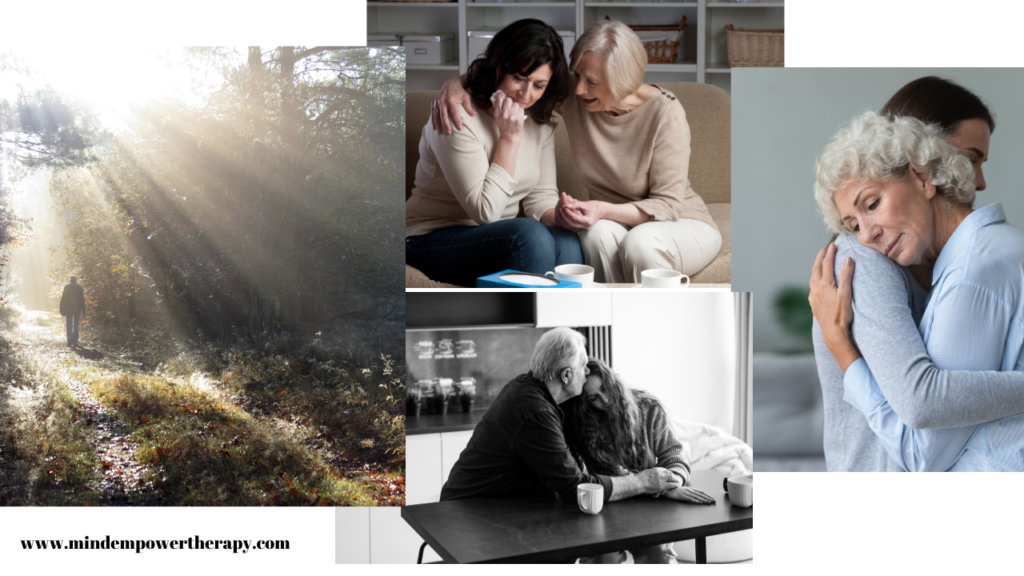Grief is a deeply personal experience that arises from loss, whether it’s the death of a loved one, the end of a relationship, or significant life changes. Understanding the nature of grief and its stages can help individuals navigate their emotions and begin the healing process.
What is Grief?
Grief is a natural response to loss, encompassing a wide range of feelings, thoughts, and behaviors. It’s important to recognize that grief is not a linear process; individuals may move back and forth between stages and experience them differently. Each person’s grief journey is unique, influenced by their relationship with the person or thing they lost, their coping mechanisms, and their support system.
Common Reactions to Grief
Grief manifests in various ways, and understanding these reactions can help individuals process their feelings:

Emotional Reactions
- Sadness: A profound sense of sorrow is perhaps the most recognized emotion associated with grief.
- Anger: Feelings of frustration or rage can emerge, sometimes directed at the situation, oneself, or even the deceased.
- Guilt: Many people experience guilt over things left unsaid or unresolved, feeling they could have done more.
- Anxiety: Uncertainty about the future or fear of forgetting the loved one can create significant distress.
Physical Reactions
Grief can also affect the body, leading to:
- Fatigue: Emotional exhaustion can leave individuals feeling physically drained.
- Sleep Disturbances: Insomnia or oversleeping is common during periods of grief.
- Changes in Appetite: Some may lose interest in food, while others might find comfort in eating.
Behavioral Changes
Grief can influence how individuals behave, such as:
- Social Withdrawal: Many people pull away from social interactions, preferring solitude.
- Avoidance: Some may avoid places or activities that remind them of their loss.
The Five Stages of Grief
Elisabeth Kübler-Ross introduced the concept of the five stages of grief, which provides a framework for understanding the emotional process of grieving. These stages include:
1. Denial
In this initial stage, individuals may struggle to accept the reality of the loss. Denial serves as a coping mechanism, allowing people to process their feelings gradually.
2. Anger
As the reality sets in, feelings of anger and frustration can surface. This anger may be directed toward oneself, others, or even the deceased. It’s essential to express this anger in healthy ways rather than suppressing it.
3. Bargaining
During this stage, individuals may find themselves making deals or bargains in an attempt to reverse or lessen the loss. This can involve thoughts like “If only I had…” or “I will do anything to have them back.”
4. Depression
As the weight of the loss becomes apparent, individuals may enter a state of deep sadness. This stage often involves mourning and reflection on the loss, as well as feelings of emptiness and hopelessness.
5. Acceptance
The final stage involves coming to terms with the loss and finding a way to move forward. Acceptance doesn’t mean forgetting but rather learning to live with the loss and integrating it into one’s life.
Coping Strategies for Grief
Finding healthy ways to cope with grief is vital for healing. Here are several effective strategies:
1. Allow Yourself to Grieve
Recognize that grief is a natural and necessary process. Give yourself permission to feel a wide range of emotions without judgment.
2. Seek Support
Reach out to friends, family, or support groups who can provide understanding and companionship. Sharing your feelings can alleviate some of the burdens of grief.
3. Establish Routines
Maintaining a daily routine can provide a sense of normalcy during chaotic times. Structure can be comforting as you navigate your emotions.
4. Express Yourself
Engaging in creative outlets like journaling, art, or music can help process feelings. Writing letters to the deceased or expressing emotions through creative mediums can be particularly cathartic.
5. Engage in Self-Care
Prioritize your physical and emotional well-being by maintaining healthy habits. Regular exercise, balanced nutrition, and adequate sleep are crucial during times of stress.
6. Consider Professional Help
If grief becomes overwhelming or leads to prolonged periods of depression, it may be beneficial to seek support from a therapist. Professional guidance can offer coping strategies tailored to your needs.
When Grief Becomes Complicated
While grief is a normal process, sometimes it can become complicated or prolonged, leading to complicated grief disorder. Signs of complicated grief include:
- Persistent yearning or longing for the deceased
- Inability to move forward with life or engage in daily activities
- Intense emotional pain that doesn’t seem to lessen over time
- Avoidance of reminders of the loss or feelings of numbness
If you notice these signs, consider seeking professional help. A mental health professional can provide strategies to navigate complicated grief and support you through the healing process.
Finding Meaning After Loss
Many individuals find comfort in creating meaning from their loss. This can involve:
- Establishing memorials or traditions to honor the deceased
- Volunteering in memory of the loved one
- Pursuing interests or passions that the loved one valued
Creating a legacy can be a powerful way to keep their memory alive while allowing yourself to heal.
FAQs About Grief
Is it normal to feel angry after a loss?
Yes, anger is a common reaction to grief and is a part of the healing process.
How long does grief last?
Grief is highly individual; some people may feel better in months, while others may take years to heal.
Can grief lead to physical health issues?
Yes, prolonged grief can affect physical health, so it’s essential to seek support if you’re struggling.
Conclusion
Coping with grief is a deeply personal journey that requires time, patience, and self-compassion. By understanding the stages of grief and employing effective coping strategies, individuals can begin to heal and find a way to honor their loved ones while moving forward with their lives. Remember, it’s okay to seek help—grief is a shared human experience, and you don’t have to navigate it alone.


Leave a Reply